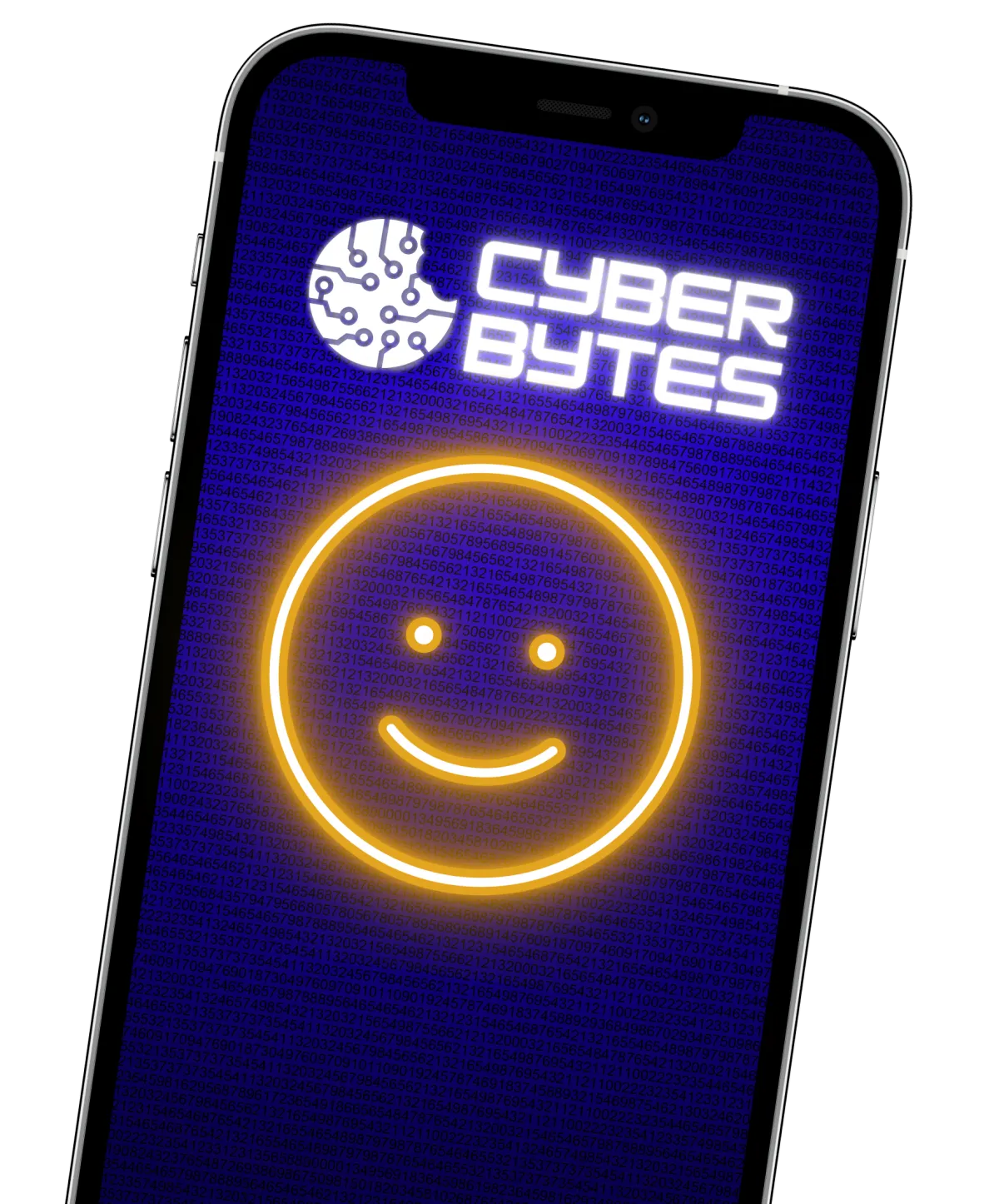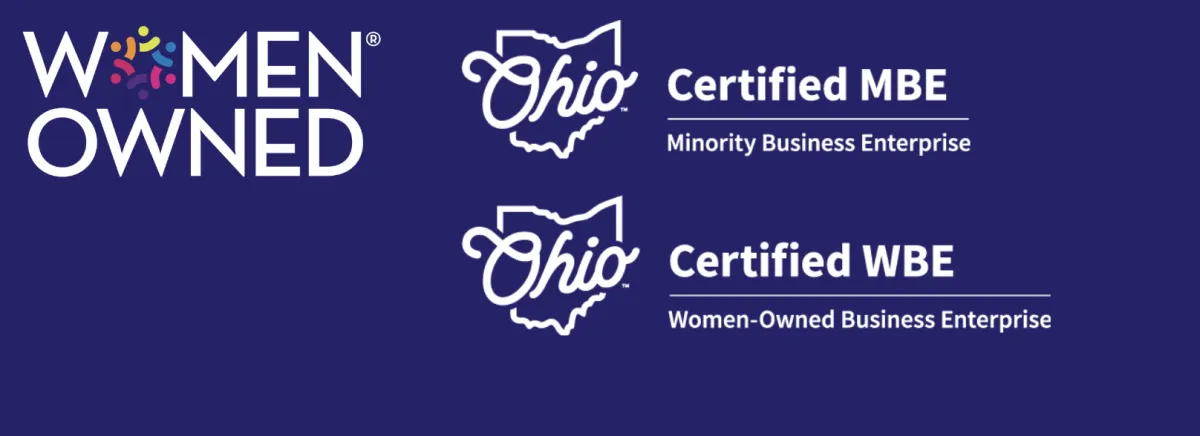You are what you click!
Learn how to make cybersecurity your way of life in an easy and guided way.
You are what you click!
Become Cyber savvy
EXPLORE BLOG BELOW
You are what you click!
Become Cyber savvy
You are what you click!
Become Cyber savvy
You are what you click!
Become Cyber savvy
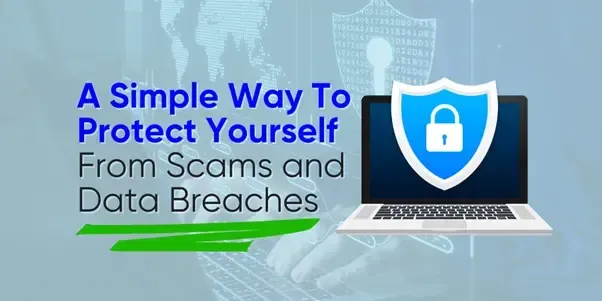
A Simple Way To Protect Yourself From Scams and Data Breaches
In today’s digital age, protecting oneself from scams and data breaches has become a crucial aspect of personal and financial security. With the increasing reliance on technology, cybercriminals are constantly devising new tactics to gain access to sensitive information and exploit vulnerabilities. From phishing emails to fake websites, the threat of scams and data breaches is ever-present. This article aims to provide insights into the common types of scams and data breaches, their impact on individuals and businesses, and practical tips on how to protect oneself from falling victim to these threats.
During times of uncertainty, adversity, and fear, hackers, scammers, and Cybermonsters increase their efforts to attack your safety. Scams and infected emails, texts and calls happen daily with the purpose to steal our sensitive information. Here are a few examples for you to watch out for so you can protect your data, your family and your business.
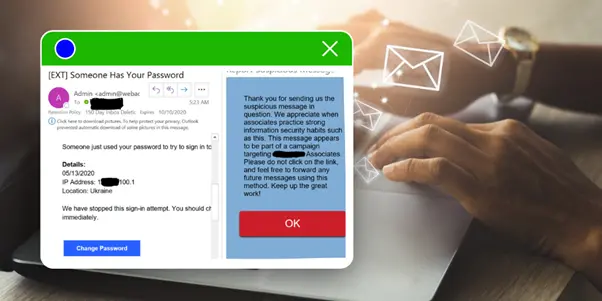
In this example, you receive a message indicating someone has used your password and they ask to click on the “change your password” link right away. The person who received the message above reported to their technical team, which you can do; however, ignoring the message is the best you can do to protect your information. Your passwords are so precious so let’s protect them! Data Breaches When you hear about the latest data breach with millions of records stolen, do you know what it means? There is an entire e-commerce system called the dark where Cybermonsters sell drugs, guns, counterfeit money, and documents. Other practices that take place in the dark web include human trafficking, fake college degrees, fake coupons, child abuse, hacking forums, and many records stolen in data breaches. In this marketplace there is a price tag for any information that has value: Your credit and debit card numbersYour social security numberYour social media user and passwordYour subscription services credentials (such as Spotify, Hulu, and Netflix)Your reward programs for airlines and hotelsYour email account Your banking dataYour healthcare information (medical records and insurance information)…and any other sensitive information that can be used to impersonate you. The more personal the information, the higher the price tag. For example, your stolen credit card or financial account information packaged with your name, your address, answer to your security questions, your social security number and any additional sensitive information would cost more than just selling your credit card number because the more information available about you, for two main reasons: It makes it easier to steal your identity and impersonate you to pursue illicit activities.It provides easier access to everything you own. Just yesterday, several Cybersecurity firms reported that over 550 million records are for sale. The massive amount of information may include your name, email, phone number, address and also your password.

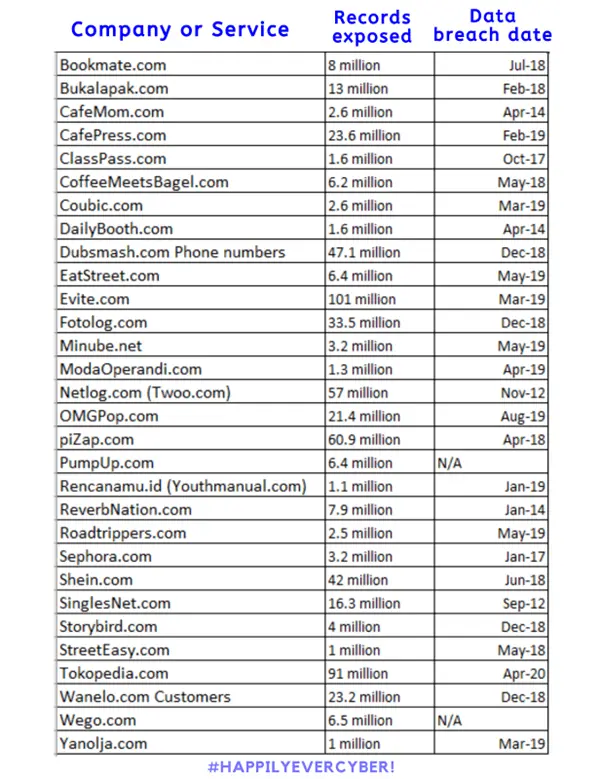
It’s worrisome that someone may already have details about you and they could easily impersonate you in the blink of an eye. What can we do about it? If you have an account on any of the services in the table below and you haven’t changed your password, now is the time to do it! And be sure to make your passwords work for you, as we previously discussed. How do you keep up with data breaches? Do not wait for your information, your family or business to be impacted by hackers, scammers, and Cybermonsters. Let’s take control of our cyber world so we can live Happily Ever Cyber!
You may Also like to read :- Vishing vs Smishing: Know the Difference
How to Safely Open An Email Attachment
3 Sure Fire Ways To Find Out If An Email is Safe
Understanding Privacy and Code of Conduct
What is a Data Breach? Understanding the Impact and Prevention
It’s time to protect your loved ones from hackers, scammers, and Cybermonsters! Inner cyber course
Live Happily Ever Cyber!

Sandra Estok
Subscribe for more ways to protect what matters most to you against hackers, scammers, and Cybermonsters™
Latest blog posts:

A Simple Way To Protect Yourself From Scams and Data Breaches
In today’s digital age, protecting oneself from scams and data breaches has become a crucial aspect of personal and financial security. With the increasing reliance on technology, cybercriminals are constantly devising new tactics to gain access to sensitive information and exploit vulnerabilities. From phishing emails to fake websites, the threat of scams and data breaches is ever-present. This article aims to provide insights into the common types of scams and data breaches, their impact on individuals and businesses, and practical tips on how to protect oneself from falling victim to these threats.
During times of uncertainty, adversity, and fear, hackers, scammers, and Cybermonsters increase their efforts to attack your safety. Scams and infected emails, texts and calls happen daily with the purpose to steal our sensitive information. Here are a few examples for you to watch out for so you can protect your data, your family and your business.

In this example, you receive a message indicating someone has used your password and they ask to click on the “change your password” link right away. The person who received the message above reported to their technical team, which you can do; however, ignoring the message is the best you can do to protect your information. Your passwords are so precious so let’s protect them! Data Breaches When you hear about the latest data breach with millions of records stolen, do you know what it means? There is an entire e-commerce system called the dark where Cybermonsters sell drugs, guns, counterfeit money, and documents. Other practices that take place in the dark web include human trafficking, fake college degrees, fake coupons, child abuse, hacking forums, and many records stolen in data breaches. In this marketplace there is a price tag for any information that has value: Your credit and debit card numbersYour social security numberYour social media user and passwordYour subscription services credentials (such as Spotify, Hulu, and Netflix)Your reward programs for airlines and hotelsYour email account Your banking dataYour healthcare information (medical records and insurance information)…and any other sensitive information that can be used to impersonate you. The more personal the information, the higher the price tag. For example, your stolen credit card or financial account information packaged with your name, your address, answer to your security questions, your social security number and any additional sensitive information would cost more than just selling your credit card number because the more information available about you, for two main reasons: It makes it easier to steal your identity and impersonate you to pursue illicit activities.It provides easier access to everything you own. Just yesterday, several Cybersecurity firms reported that over 550 million records are for sale. The massive amount of information may include your name, email, phone number, address and also your password.


It’s worrisome that someone may already have details about you and they could easily impersonate you in the blink of an eye. What can we do about it? If you have an account on any of the services in the table below and you haven’t changed your password, now is the time to do it! And be sure to make your passwords work for you, as we previously discussed. How do you keep up with data breaches? Do not wait for your information, your family or business to be impacted by hackers, scammers, and Cybermonsters. Let’s take control of our cyber world so we can live Happily Ever Cyber!
You may Also like to read :- Vishing vs Smishing: Know the Difference
How to Safely Open An Email Attachment
3 Sure Fire Ways To Find Out If An Email is Safe
Understanding Privacy and Code of Conduct
What is a Data Breach? Understanding the Impact and Prevention
It’s time to protect your loved ones from hackers, scammers, and Cybermonsters! Inner cyber course
Live Happily Ever Cyber!

Sandra Estok
Subscribe for more ways to protect what matters most to you against hackers, scammers, and Cybermonsters™
Stop Hackers, Scammers and Cybermonsters in their tracks.
Take charge of your Cyber Life today!
Push Cybermonsters away from your private data.
Subscribe to my newsletter about cybersecurity and cyber safety. New issues every Tuesday.
